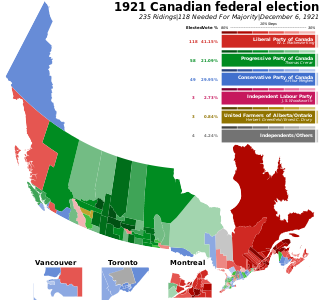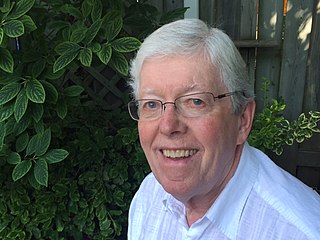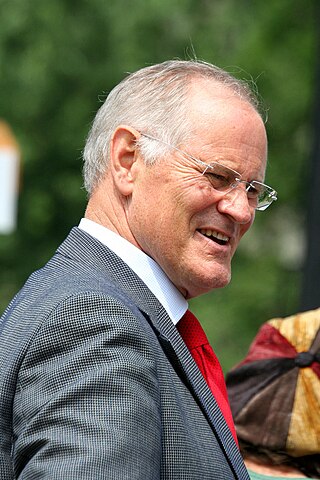
The 1921 Canadian federal election was held on December 6, 1921, to elect members of the House of Commons of Canada of the 14th Parliament of Canada. The Union government that had governed Canada through the First World War was defeated, and replaced by a Liberal government under the young leader William Lyon Mackenzie King. A new third party, the Progressive Party, won the second most seats in the election.

The 1988 Canadian federal election was held on November 21, 1988, to elect members to the House of Commons of Canada of the 34th Parliament of Canada. It was an election largely fought on a single issue: the Canada–United States Free Trade Agreement (CUSFTA); the Progressive Conservative Party campaigned in favour of it whereas the Liberal Party and the New Democratic Party (NDP) campaigned against it.

Ralph Edward Goodale is a Canadian diplomat and retired politician who has served as the Canadian High Commissioner to the United Kingdom since April 19, 2021.
Unity, United Progressive Movement and United Reform were the names used in Canada by a popular front party initiated by the Communist Party of Canada in the late 1930s.

David Edward Crombie is a Canadian former academic and politician who served as the 56th mayor of Toronto from 1972 to 1978. Crombie was elected to Parliament following his tenure as mayor. A member of the Progressive Conservative (PC) Party, he served as minister of national health and welfare from 1979 to 1980, minister of Indian affairs and northern development from 1984 to 1986, and secretary of state for Canada from 1986 to 1988.

The 1980 Canadian federal election was held on February 18, 1980, to elect members of the House of Commons of Canada of the 32nd Parliament of Canada. It was called when the minority Progressive Conservative government led by Prime Minister Joe Clark was defeated in the Commons.

The 1945 Canadian federal election was held on June 11, 1945, to elect members of the House of Commons of the 20th Parliament of Canada. Prime Minister William Lyon Mackenzie King's Liberal government was re-elected to its third consecutive term, although this time with a minority government as the Liberals fell five seats short of a majority.

The 1979 Canadian federal election was held on May 22, 1979, to elect members of the House of Commons of Canada of the 31st Parliament of Canada. It resulted in the defeat of the Liberal Party of Canada after 16 years in power, 11 of them under Prime Minister Pierre Trudeau. Joe Clark led the Progressive Conservative Party to power but with only a minority of seats in the House of Commons. The Liberals, however, beat the Progressive Conservatives in the overall popular vote by more than 400,000 votes. Taking office on the eve of his 40th birthday, Clark became the youngest prime minister in Canadian history.

David Samuel Horne MacDonald is a Canadian United Church of Canada minister, former politician, and author.
Steven W. Mahoney, is a Canadian politician. He was a member of the Legislative Assembly of Ontario from 1987 to 1995, and a member of the House of Commons of Canada from 1997 to 2004. In the latter capacity, he served as a cabinet minister in the government of Jean Chrétien. Mahoney is a member of the Liberal Party.

Toronto Centre is a federal electoral district in Toronto, Ontario, Canada, that has been represented in the House of Commons of Canada from 1872 to 1925, and since 1935, under the names Centre Toronto (1872–1903), Toronto Centre, Rosedale (1935–1997), and Toronto Centre—Rosedale (1997–2004).
Wajid Ali Khan is a Canadian businessman and politician. Between 2004 and 2008, he was a member of the House of Commons of Canada, representing the riding of Mississauga—Streetsville as a Conservative Member of Parliament. In March 2018, he was arrested by the Royal Canadian Mounted Police and charged with three counts of fraud, three counts of false pretense and one count of uttering a forged document.

The 1983 Progressive Conservative leadership election was held on June 11, 1983, in Ottawa, Ontario to elect a leader of the Progressive Conservative Party of Canada. At the convention, Montreal businessman and lawyer Brian Mulroney was elected leader on the fourth ballot, defeating former prime minister and party leader Joe Clark.
The Freedom Party of Ontario is a political party in Ontario, Canada.
John Martin Oostrom was a Canadian business executive and politician. He was the first Dutch-born Canadian elected to the House of Commons of Canada.

Albert Edward Smith, known as A. E. Smith, was a Canadian religious leader and politician. A social gospeller, Smith was for many years a minister in the Canadian Methodist Church before starting his own "People's Church". He served in the Legislative Assembly of Manitoba from 1920 to 1922 as a Labour representative. In 1925, he became a member of the Communist Party of Canada.
David Rotenberg was a Canadian politician in Ontario. He served in the Legislative Assembly of Ontario from 1977 to 1985 as a member of the Progressive Conservative Party, and was briefly a cabinet minister in the government of Frank Miller.

William Carvel Graham was a Canadian lawyer, academic and politician. Graham served as the minister of foreign affairs, minister of national defence, leader of the opposition and interim leader of the Liberal Party of Canada. After leaving politics, he was the chancellor of Trinity College at the University of Toronto.
Michael Maccagno was a politician from Alberta, Canada. He served as a Member of the Legislative Assembly of Alberta from 1955 to 1968, and leader of the Alberta Liberal Party from 1964 to 1968.
Margaret Campbell was a politician in Ontario, Canada. She was a Liberal member of the Legislative Assembly of Ontario who represented the downtown Toronto riding of St. George. Prior to her provincial role she served as a municipal councillor in Toronto from 1958 to 1962 and then as a member of the Board of Control from 1964 to 1969. She ran for mayor of Toronto in 1969 but came in second to William Dennison.












